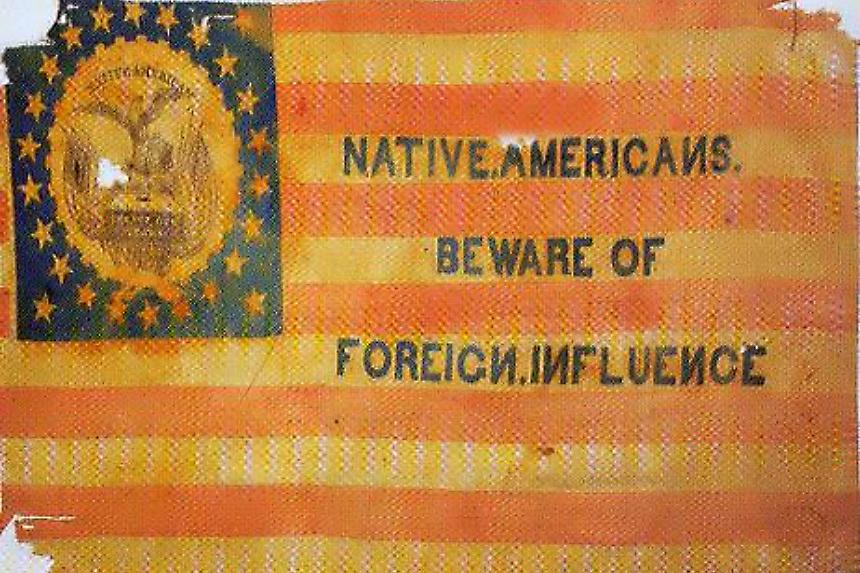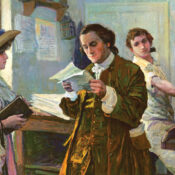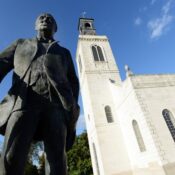For as long as people have been emigrating to our country, we have struggled with the question of how to treat newcomers.
Throughout America’s history, our immigration policies have often been driven by fear. In 2002, it was the fear of terrorism. In 1918, it was worries about communists. In the 1880s, it was the perceived threat of Chinese workers. And in the 1840s, it was the fear of Catholics.
Actually, the issue then was broader than religion alone. Americans feared the country was being overrun by foreigners. The number of immigrants entering the country rose from 100,000 per year to 2.9 million by mid-century — most of them Catholics coming from Ireland and Germany.
Many Protestant Americans believed these newcomers would never fit into American culture. They believed they were idlers and drunkards who were causing a rise in crime and poverty, and would vote as their religious authorities told them to.
In Boston, where Protestants felt threatened by an influx of Irish, mobs repeatedly attacked Catholic immigrants and even burned down a convent.
In 1836, “Awful Disclosures of Maria Monk, or, The Hidden Secrets of a Nun’s Life in a Convent” was published. It purported to be a woman’s account of the sexual abuse and baby murders she had witnessed in a Catholic convent. It was a total fabrication spiced with bigotry and pornography, but it sold 300,000 copies and added to religious paranoia.
In May and July 1844, nativists in Philadelphia demanded that Catholic children in public schools be forced to sing Protestant hymns. To show their strength and resolve, they staged a demonstration in an Irish neighborhood. It started a four-day riot, resulting 14 dead and two Catholic churches burned down. In July, the nativists were back, attacking the state militia protecting another Catholic church, leaving 15 dead.
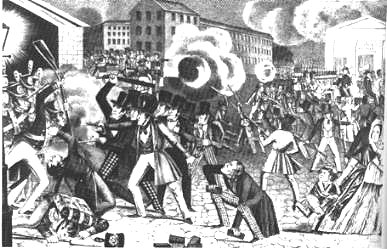
Meanwhile nativist riots broke out in New York, Baltimore, Chicago, and Cincinnati.
These fractious times presented a golden opportunity for a political party that could capitalize on the fear and hatred of foreigners. In 1849, Charles B. Allen of New York launched the Order of the Star Spangled Banner, a secret society that would promote nativism — the rejection of foreigners and foreign influences. It also hoped to prevent the wholly fictional threat of the Pope leaving the Vatican and seizing control of the Mississippi Valley.
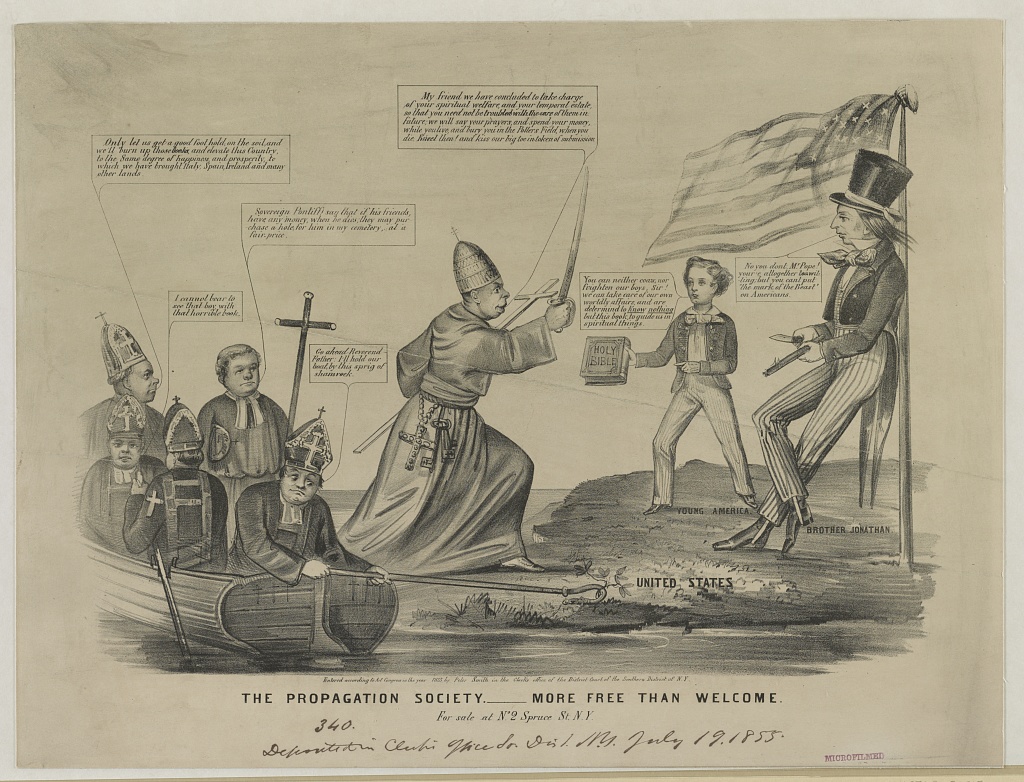
The Order wanted to strictly limit immigration, exclude all foreign-born citizens from holding public office, extend the residency requirement for naturalization from five years to 21, eliminate all Catholic influences from American society, and require daily readings from a Protestant bible in schools.
The Order was so secretive that its members were ordered to divulge no information about it. When asked about the OSSB, members were to reply, “I know nothing about it.” This response earned the order the nickname of the “Know-Nothings.”
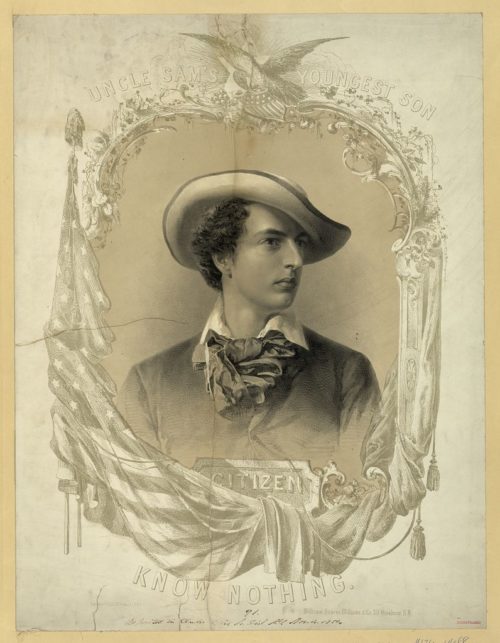
Despite its secretiveness, the Order spread across America, finding thousands of supporters. By now, it was calling itself “The American Party.”
But just as many threw their support behind the Know Nothing, nativist cause, many others bitterly opposed its principles, which were spelled out in “A Defense of American Policy,” written by Thomas R. Whitney.
Reviewing the book on May 31, 1856, the Post editors wrote:
Its most noticeable features are its shallowness, its bigotry, its recklessness of assertion, its sophistical warping of facts to its own purposes, its lack of knowledge, its ignorance of the philosophy of republican institutions, its impudent nationality, its general inhumanity, and its utter practical denial of the brotherhood of the race and the fatherhood of God.
The American Party did well in the elections of 1854, winning control of the Massachusetts, Delaware, and Pennsylvania assemblies, and 43 of the 234 seats in the U.S. Congress.
By the next year, they controlled New Hampshire, Rhode Island, Connecticut, Maryland and Kentucky, and formed large minorities in southern states. Party leaders believed they had a serious chance of winning the presidency in 1856.
The Know-Nothings’ success was only partly due to its anti-Catholic/immigrant agenda. It also gained support from the collapsing Whig party. The abolitionist movement had divided the Whigs. Party leadership hadn’t been able to reconcile its pro- and anti-slavery faction, and many Whigs were leaving their party. Many switched to the Know-Nothing party; two years later, the Whig Party was gone
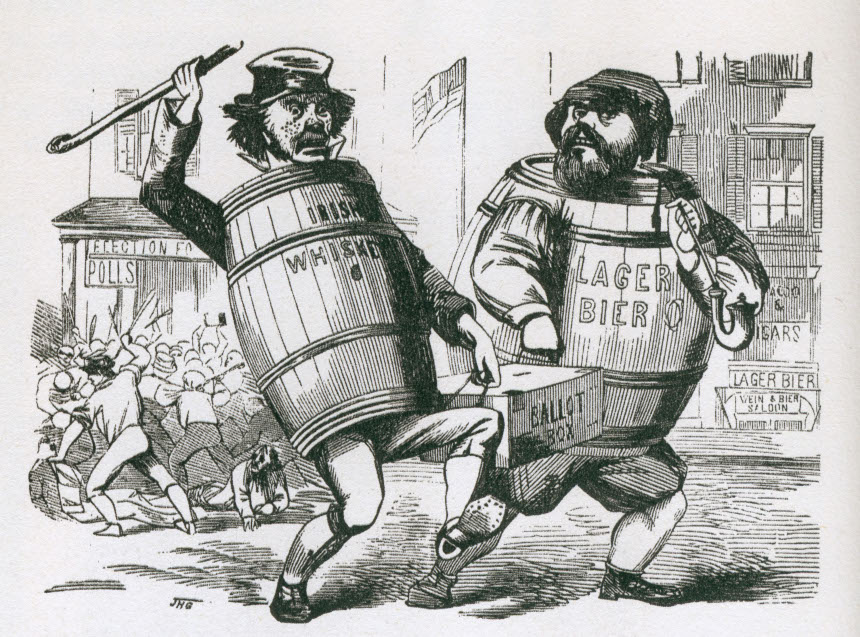
But the Know-Nothings had little time to enjoy their success.
Once elected, the Know-Nothings found they could get little cooperation from other parties. Congress refused to act on immigration reforms from its Know-Nothing members. In the Massachusetts, the Know-Nothing governor and legislature let their immigration bills die in committee. They set up a board to investigate sexual scandals in Catholic convents, but found nothing — other than that the principle reformer was using committee funds to pay for sex. A search of Catholic schools for guns and other evidence of impending rebellion produced nothing beyond laughter from their critics.
But even these problems weren’t enough to destroy the Know-Nothing Party. That was accomplished by the same problem that ended the Whig party: clashes over race.
Southern members were pushing the party to support slavery. This caused Abraham Lincoln to write:
Our progress in degeneracy appears to me to be pretty rapid. As a nation, we began by declaring that ‘all men are created equal.’… When the Know-Nothings get control, it will read ‘all men are created equals, except negroes and foreigners and Catholics.’ When it comes to that I should prefer emigrating to some country where they make no pretense of loving liberty—to Russia, for instance, where despotism can be taken pure, and without the base alloy of hypocrisy.
Northern Know-Nothings would have nothing to do with slavery. At the party’s national convention, a debate on the issue caused members to storm out. It ended the convention and, in effect, the party.
Immigration, foreigners, religion, culture wars — any of these issues are big enough to support a major political party, and win elections.
Until a more critical issue comes along.
Featured image: The Know-Nothings flag circa 1850 (Wikimedia Commons)
Become a Saturday Evening Post member and enjoy unlimited access. Subscribe now
